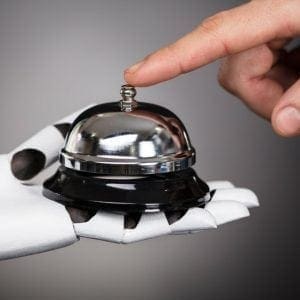Today in the hotel industry we are facing some radical shifts from the traditional leadership role to an inclusive leadership role.

New technology, new media, and social media trigger rapid changes, and in some cases, services and products become obsolete overnight. And new competitors arise from uncontested markets.
Traditional leaders need to change and adapt, or the culture will not be able to respond to new demands.
The new shift will require inclusive leadership that focuses on a new value system, one that will grow despite disruptions, new competitors, new tools, new technology, new media and social media.
The inclusive leadership role
The inclusive leader focuses on what acts and activities leaders need to undertake to boost their teams’ motivation and business results, not on who leaders need to be.
What inclusive leaders strive to do is convert the vast majority of disengaged employees into engaged ones, thereby achieving a high-impact transformation.
To achieve this, they focus on eliminating and reducing activities that add little or no value and raising and creating activities that contribute to effective leadership.
This type of framework allows the inclusive leader to challenge traditional leadership models and translate the findings into concrete, actionable, strategic options that pursue both differentiation and low cost.
When you look at the hotel industry, a five-star hotel roughly offers what other five-star hotels provide, and the same goes for a two-star hotel. In essence, hotels compete on the same set of factors.
Out of disruptions, new competition, new tools, new technology, new media and social media, a new set of customers has arisen.Ê (Hint, it’s not Millennials.)
The connected customer
Today we experience a type of customer that travelers more frequently with their mobile devices. They like to explore and share their experience with their social community. We call them the connected customer.
This type of customer books their hotel on a few key emotional and rational factors. They want to have the feeling of luxury, a more luxurious sleeping environment, and the the benefits of the hotel’s prime location.
The connected traveler takes advantage of technology and their community to assist with tasks like finding directions and locating restaurants and local attractions themselves.
A shift towards inclusive leadership embraces the new values that the connected customer is looking for.
The inclusive leadership role takes on a new perspective where they analyze how managers on each level invest their time and effort as perceived by their customers.
One of the primary goals is to close the gap between the company perspective and the customer perspective.
Most hotels have a fair idea of how costs generally are broken down across their value chain.
One of the key advantages of connected customers is that they are actively seeking to communicate directly with hotels.
This provides the inclusive leader with new unique opportunities when looking to eliminate and reduce activities that add little or no value and raise and create activities that contribute to effective leadership.
Inclusive leadership a new alternative
Like any shift, defining a new alternative leadership role goes to various strategic processes.
One of the key fundamentals for the inclusive leader to focus on is value innovation. In many metropolitan areas, the explosive growth in hotels inventory is starting to over saturate the market, which results in stiff competition, shrinking demand and reduced profit margins.
The inclusive leader challenges the traditional competitive perspective and looks to create opportunities that unleash new untapped talents and potential.
The connected customer embraces creativity and cooperation. They are there for the inclusive leader to help change the hotel in a positive and creative way.
The role of inclusive leaders is not to do what is easy. It is to do what is worthwhile. And in that, there is no doubt some difficulty.
It all starts with broadening your scope of thinking, assessing your own strengths, and focusing on areas where you bring the greatest advantage.
Equally important is the effort to put together, isolate, and motivate the best hotel team for the journey ahead.
When the hotel team sees the strategic reality and agrees on the need for change and growth, only then can you create real alignment and a collective will to make the shift.
The inclusive leadership role primary focus is on ÒvalueÓ and ÒinnovationÓ.
Value is crucial because it forces the leader not to rest on their laurels, but to assess each reference point of the hotel based on the value currently delivered to their customers. The value delivered ÒtodayÓ drives customer behaviors, which determine future growth opportunities, whereas value delivered ÒyesterdayÓ determined your hotel’s current market share.
Inclusive leaders recognize common pain points and then start eliminating them.
They break challenges into small concrete steps that move people forward in increments that inspire and build their confidence. Removing common pain points will bring out patterns that represent a culture that in many cases has represented the core values for the hotel.
To draw out pain points, the inclusive leader will approach the simplicity of the hotel industry or zoom in on customer groups that could benefit from the industry’s offering but don’t currently purchase it.
An inclusive leadership role requires three primary traits:
- The ability and focus to deliver extraordinary value
- A unique desire to learn
- An understanding of the combination of hard work and smart time use
Shortcuts never pay off, but if there is a smart, simple solution that adds value to the customer, this is the road to take.
Creating a team of ambassadors
Today it is not uncommon that connected customers scan the hotel industry for the leading thinkers and innovators. These are the people they want to work either with or for.
Inclusive leaders embrace thought leadership. Thought leadership is an external function aimed to influence clients and new business prospects. In addition, they inspire and motivate employees and function like a talent retention and attraction magnet.
Hotels that strategically involve their employees in the thought-leadership journey Ð from marketing and sales through to operations and finance ÂÐ will find a number of happy reference points.
Investing in thought leadership gives employees something to talk about over and above the services they provide, empowering them to have deeper conversations and foster more meaningful relationships with guests and customers.
Turning your hotel team members into brand ambassadors is an effective way to get closer to customers.
Brand ambassadors will take ownership of the new brand culture in ways that generate improved engagement which leads to action.
Team members, customers, and communities are full of potential brand ambassadors. Hotels simply need to find ways to reach out to them and develop their network. That being said, a culture and brand to be proud of is where it all starts.
About the author
















